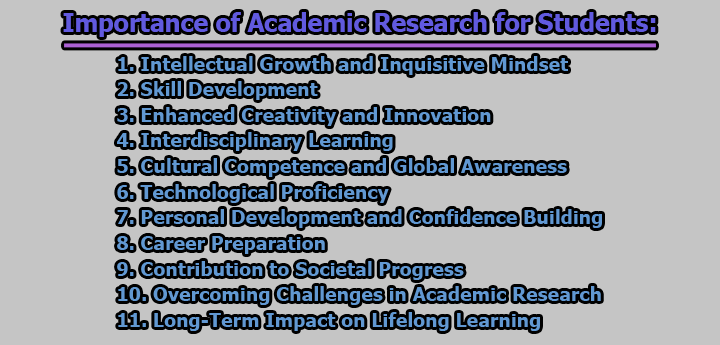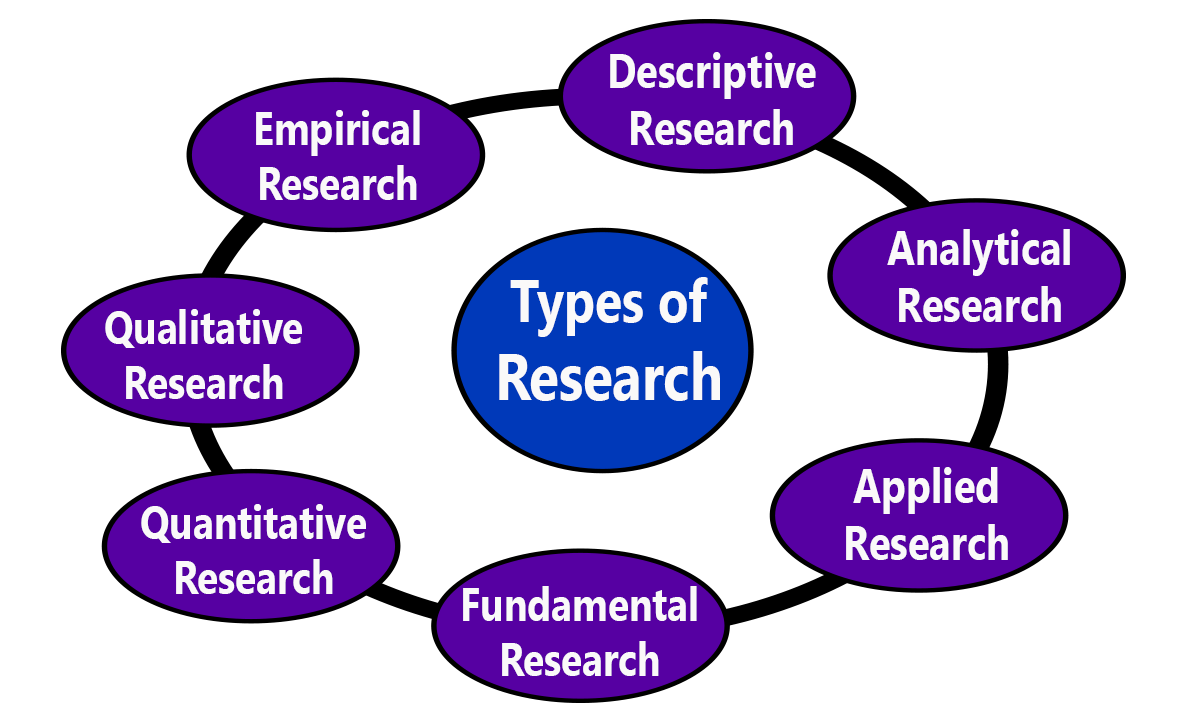Importance of Academic Research for Students:
Academic research plays a pivotal role in the educational journey of students, serving as a cornerstone for intellectual growth and development. The pursuit of knowledge through research not only enhances students’ understanding of their chosen fields but also cultivates critical thinking, problem-solving skills, and a deeper appreciation for the intricacies of their disciplines. In this article, we will delve into the multifaceted importance of academic research for students, exploring its impact on intellectual growth, skill development, career preparation, and contribution to societal progress.
1. Intellectual Growth and Inquisitive Mindset:
a) Developing a Curious Mind: Academic research instills a sense of curiosity and a thirst for knowledge within students. The process of inquiry, hypothesis formulation, and evidence gathering encourages students to question established ideas, fostering a mindset of intellectual curiosity that extends beyond the classroom.
b) Expanding Knowledge Base: Through engagement in academic research, students are exposed to a vast array of information, theories, and methodologies relevant to their field of study. This exposure not only broadens their knowledge base but also enables them to gain a comprehensive understanding of the subject matter, beyond what is covered in traditional coursework.
c) Building Analytical Skills: Research requires students to analyze information critically, evaluate the reliability of sources, and draw meaningful conclusions. These analytical skills are transferable to various aspects of life, equipping students with the ability to approach problems systematically and make informed decisions.
2. Skill Development:
a) Critical Thinking and Problem-Solving: One of the primary benefits of academic research is the development of critical thinking skills. Students learn to evaluate information, discern between valid and unreliable sources, and apply analytical reasoning to solve complex problems. These skills are invaluable, not only in academic pursuits but also in professional and personal life.
b) Effective Communication: Conducting research involves not only gathering information but also effectively communicating findings. Students learn to articulate their thoughts, present arguments coherently, and disseminate information through written reports, presentations, and discussions. These communication skills are vital for success in both academic and professional settings.
c) Time Management and Organization: The research process requires meticulous planning, organization, and time management. Students must allocate their time effectively to gather, analyze, and synthesize information within specified deadlines. These organizational skills are transferable to various aspects of life, helping students balance academic, work, and personal commitments.
d) Information Literacy: Engaging in academic research hones students’ information literacy skills, enabling them to navigate vast databases, distinguish between primary and secondary sources, and critically assess the credibility of information. In an era of information overload, these skills are essential for making informed decisions and staying abreast of current developments.
3. Enhanced Creativity and Innovation:
a) Exploring Alternative Perspectives: Engaging in academic research encourages students to explore alternative perspectives and think creatively. By challenging existing theories or proposing innovative approaches to problems, students contribute to the evolution of ideas within their respective fields.
b) Innovation in Methodologies: Research often involves the development and refinement of methodologies. Through experimentation and exploration of novel research techniques, students contribute to the continuous evolution of research methodologies, fostering innovation within their disciplines.
4. Interdisciplinary Learning:
a) Integration of Knowledge from Various Disciplines: Research projects often require students to draw on knowledge from multiple disciplines. This interdisciplinary approach promotes a holistic understanding of complex issues, encouraging students to connect ideas and concepts from diverse fields to create comprehensive solutions.
b) Breaking Down Academic Silos: Engaging in interdisciplinary research helps break down academic silos, fostering collaboration between different departments and fields of study. Students learn to appreciate the interconnectedness of knowledge and the importance of cross-disciplinary collaboration in addressing complex global challenges.
5. Cultural Competence and Global Awareness:
a) Exposure to Diverse Perspectives: Research projects often involve collaboration with individuals from diverse cultural backgrounds. This exposure enhances students’ cultural competence, as they learn to appreciate and integrate different perspectives, ideas, and methodologies in their research.
b) Addressing Global Issues: Many research endeavors have global implications. Students, through their academic research, can contribute to addressing global challenges such as climate change, public health crises, and social inequality. This global awareness instills a sense of responsibility and citizenship.
6. Technological Proficiency:
a) Utilizing Advanced Technologies: Research often involves the use of cutting-edge technologies and tools. Engaging in academic research exposes students to these technologies, enhancing their technical proficiency and preparing them for the technological demands of their future careers.
b) Adaptability to Technological Changes: The fast-paced nature of technological advancements requires individuals to be adaptable. Students involved in research learn to adapt to new technologies, stay informed about emerging trends, and apply these advancements to their research projects.
7. Personal Development and Confidence Building:
a) Independence and Self-Direction: Research projects often require a high degree of independence and self-direction. As students take ownership of their research, they develop a sense of responsibility, autonomy, and self-discipline, contributing to their personal and academic growth.
b) Confidence in Problem-Solving: Successfully navigating the challenges of a research project builds students’ confidence in their problem-solving abilities. Overcoming obstacles and reaching research milestones instills a sense of accomplishment, fostering a positive self-image.
8. Career Preparation:
a) Practical Application of Knowledge: Academic research provides students with an opportunity to apply theoretical knowledge to real-world situations. This practical application enhances their understanding of concepts and prepares them for the challenges they may encounter in their future careers.
b) Specialization and Expertise: In many fields, employers seek candidates with specialized knowledge and expertise. Engaging in research allows students to delve deeper into specific areas of interest, becoming subject matter experts and distinguishing themselves in a competitive job market.
c) Networking Opportunities: Conducting research often involves collaboration with professors, peers, and industry professionals. These interactions create networking opportunities that can be valuable for future career prospects. Building a professional network through research can open doors to internships, job opportunities, and collaborative projects.
d) Research Publications and Academic Recognition: For students aspiring to pursue advanced degrees or enter academia, having research publications can significantly enhance their credentials. Engaging in meaningful research projects allows students to contribute to the academic community, garnering recognition for their work and establishing a foundation for a successful academic career.
9. Contribution to Societal Progress:
a) Advancing Knowledge and Innovation: Academic research is a driving force behind the advancement of knowledge and innovation. Students, through their research endeavors, contribute to the collective understanding of various phenomena, paving the way for new discoveries, technologies, and solutions to societal challenges.
b) Addressing Societal Issues: Many research projects are designed to address pressing societal issues. Students can use their academic research to explore and propose solutions to problems such as poverty, inequality, environmental degradation, and healthcare disparities. By actively participating in research that has real-world applications, students become agents of positive change.
c) Social Responsibility and Ethical Considerations: Engaging in academic research fosters a sense of social responsibility among students. They learn to consider the ethical implications of their research, ensuring that their work upholds moral standards and contributes positively to society. This ethical awareness is crucial in a world where the impact of research extends beyond academic realms.
10. Overcoming Challenges in Academic Research:
a) Developing Resilience: The research process is often fraught with challenges, including setbacks, data limitations, and unexpected obstacles. Students learn to develop resilience and perseverance as they navigate these challenges, skills that are essential for success in any endeavor.
b) Embracing Failure as a Learning Opportunity: Not all research endeavors result in groundbreaking discoveries or successful outcomes. Students learn to embrace failure as a natural part of the research process, understanding that setbacks can provide valuable insights and opportunities for improvement.
c) Seeking Feedback and Collaboration: Effective research involves seeking feedback from peers, mentors, and experts in the field. Students develop humility and a willingness to collaborate, recognizing that diverse perspectives enhance the quality of their research.
11. Long-Term Impact on Lifelong Learning:
a) Cultivating a Lifelong Learning Mindset: The skills acquired through academic research, including critical thinking, effective communication, and adaptability, contribute to the development of a lifelong learning mindset. Students become self-motivated learners, continuously seeking new knowledge and staying intellectually engaged throughout their lives.
b) Staying Informed in Evolving Fields: In rapidly evolving fields, staying informed is crucial. Engaging in research during academic years equips students with the skills to stay abreast of developments in their chosen fields, ensuring they remain relevant and competitive in their careers.
In conclusion, the importance of academic research for students is far-reaching and transformative. It serves as a catalyst for intellectual growth, skill development, and career preparation. Beyond the individual benefits, research contributes to societal progress, fostering innovation and addressing global challenges. Students engaged in research cultivate a mindset of lifelong learning, adaptability, and social responsibility. As they navigate the complexities of the research process, students not only contribute to the expanding body of knowledge but also emerge with a diverse skill set, global awareness, and a profound sense of personal and academic accomplishment. Academic research, therefore, stands as a cornerstone of education, equipping students with the tools and mindset needed to thrive in an ever-evolving world.

Library Lecturer at Nurul Amin Degree College










